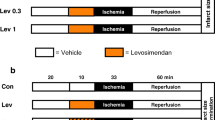Abstract.
Objective: Brief periods of ischemia precondition the heart and reduce the size of infarction caused by a subsequent sustained ischemia. The molecular memory of preconditioning, i.e., the molecule persistently activated by the preconditioning ischemia exhibiting protection during the infarct-inducing event, is subject to debate. Protein kinase C, adenylyl cyclase and β-adrenergic receptors are candidates for this memory, supposedly their activation persists during several cycles of ischemia and reperfusion. The goal of this study was, therefore, to determine the activation of those signaling molecules after 1 – 3 cycles of myocardial ischemia and reperfusion. Methods: Rat hearts were perfused according to the method of Langendorff with 1 – 3 cycles of ischemia (5 min) and reperfusion (10 min). In the particulate fraction of these hearts, densities of b-adrenergic receptors, activities of adenylyl cyclase, and the activities and isozyme distributions of PKC-α, PKC-β, and PKC-ɛ were determined. Results: The ischemia-induced upregulation of β-adrenergic receptors is not influenced by preconditioning. In contrast, the sensitization of adenylyl cyclase observed after 5 min of ischemia is lost after repetitive periods of ischemia and reperfusion. Translocation of protein kinase C to the particulate fraction could be shown after 1 and 2 periods of ischemia including all major cardiac isozymes, with a rapid relocation to the cytosol after every cycle of reperfusion. A third period of ischemia was unable to promote a repeated translocation of protein kinase C. Conclusion: The ischemia-induced regulation process of β-adrenergic receptors is not influenced in preconditioning. Moreover, a sustained translocation of protein kinase C and a sustained sensitization of adenylyl cyclase are obviously no prerequisite for preconditioning after various cycles of ischemia and reperfusion. Thus, those signaling molecules do not seem to be operative for the preconditioning's memory. It is suggested that the initial, synergistic burst of sensitization of the adenylyl cyclase and of protein kinase C translocation induces myocardial protection very early in ischemia and reperfusion.
Similar content being viewed by others
Author information
Authors and Affiliations
Additional information
Received: 17 January 2002, Returned for 1. revision: 21 January 2002, 1. Revision received: 13 December 2002, Returned for 2. revision: 23 December 2002, 2. Revision received: 3 January 2003, Accepted: 8 January 2003
Parts of this study were presented at the Annual Meetings of the American Heart Association 1996 and of the American College of Cardiology 2000. The Deutsche Forschungsgemeinschaft, Bonn, supported this study with grants to R.H.S. (SFB 320) and to C.W. (W 1955/2-1). R.H.S was supported by the Hermann-Lilly-Schilling Foundation.
Correspondence to: G. Simonis, M.D.
Rights and permissions
About this article
Cite this article
Simonis, G., Weinbrenner, C. & Strasser, R. Ischemic preconditioning promotes a transient, but not sustained translocation of protein kinase C and sensitization of adenylyl cyclase. Basic Res Cardiol 98, 104–113 (2003). https://doi.org/10.1007/s00395-003-0397-8
Issue Date:
DOI: https://doi.org/10.1007/s00395-003-0397-8



